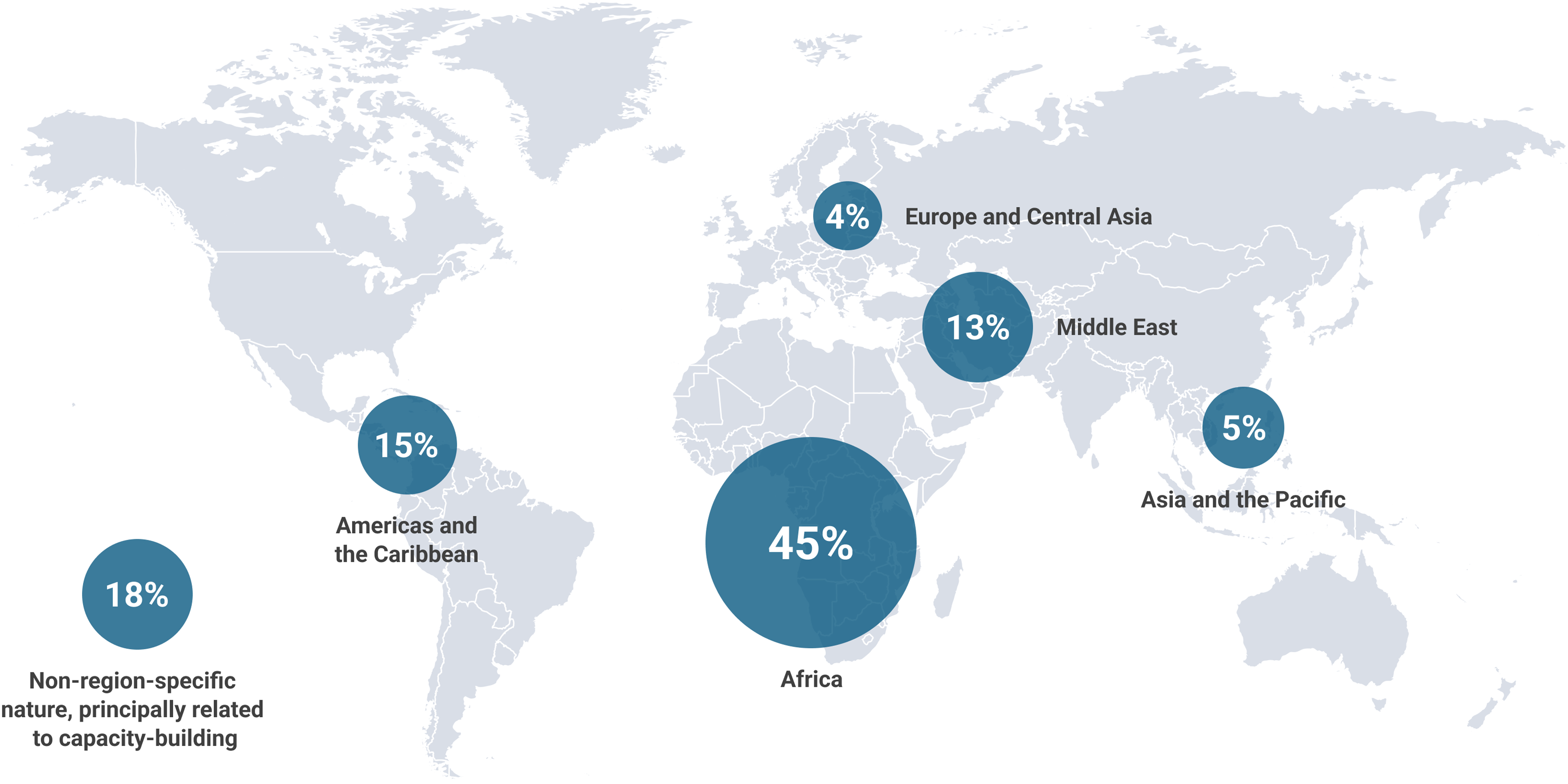The Mediation Support Unit (MSU) in the Department of Political and Peacebuilding Affairs (DPPA) serves as the UN system-wide focal point on mediation expertise and support. The Unit, inter-alia, provides tailored operational support to peace and dialogue processes through expert staff from the Unit and the Standby Team of Senior Mediation Advisors (SBT).
What We Do
MSU’s core competencies include operational assistance with mediation and peace processes, targeted capacity building to partners, and developing mediation guidance, lessons learned, and best practices.
MSU staff, including in-house experts on ceasefires, constitution-making, and process design, are able to provide tailored support throughout the planning, implementation and evaluation phases of a mediation process. The Unit also manages the Standby Team of Senior Mediation Advisers (SBT), which can be mobilized as a complementary mediation support capacity.
The Unit organizes a series of flagship trainings, including the UN High Level Mediation Course, the Ceasefire Mediation Course and the Women in Ceasefire Negotiations Course. MSU furthermore develops and maintains guidance and resources for mediators. This includes a searchable database of peace agreements – allowing mediators to compare language across some 75,000+ provisions of 1,300 agreements. When requested, MSU also provides tailored guidance, often involving comparative case analysis, to field missions.
MSU partners frequently with various regional organizations. It is also a member of several mediation networks, including the Group of Friends on Mediation and the Mediation Support Network, and engages regularly with the Global Alliance of Regional Women Mediator Networks.
DPPA’s mediation support capacity relies predominantly on funding from the Multi-Year Appeal (MYA) – including to allow for on-the-ground support to peace discussions. Sustained funding will allow MSU to continue to deploy operational expert support where needed and to develop innovative approaches and mediation guidance in emerging fields such as digital technologies, climate, local and sub-national mediation, and the youth, peace and security agenda.
Global

Flexible

Fast

Innovative & Inclusive

Expanding Our Knowledge and Helping Others to Learn
Visit the resources page for further guidance, policy and practice documents on mediation.
2023 Highlights



2023 Support by Theme
2023 Support by Region

Snapshot of Current Activities
Updated December 31 2024
Chile
From 4 to 8 November, an SBT process design expert and a staff member from MSU deployed to Santiago de Chile in support of the Presidential Commission for Peace and Understanding. This deployment, closely coordinated with the DPPA-DPO Americas Division and the RCO Chile, builds on previous UN support provided to the Commission throughout 2024. During the deployment, the SBT member and the MSU staff member engaged with a broad range of stakeholders, including government officials, Commission members and private sector representatives to strengthen UN technical engagement and assistance. Drawing on international best practice, the team shared key lessons on consensus-building, forms of institutionalized dialogue, and implementation and follow-up mechanisms, offering valuable insights to strengthen the Commission’s ongoing work ahead of it delivering its recommendations to the Presidency in the coming months.
No activity during this period
Yemen
MSU’s senior advisor on ceasefires and security arrangements continued to provide technical advice and support to the OSESG-Yemen. MSU provided technical advice in planning a series of reflections offered to the Military Coordination Committee (MCC). As part of these engagements, the MSU advisor supported the conduct of a three-day meeting with a Government of Yemen delegation in December 2024. The support is expected to continue in 2025.
East African Community (EAC)
The SBT expert on gender and inclusion was deployed to Bujumbura, Burundi from 30 October to 1 November to provide input into the substance and structure of the final version of the EAC Regional Action Plan on Women, Peace and Security and support its validation exercise. This deployment was a follow-up to a joint DPPA/EAC/UN-Women workshop held in Entebbe, Uganda in December 2023 on “Strengthening the Women, Peace and Security Agenda in the EAC Region” that developed the draft Regional Action Plan on WPS.
The validation meeting brought together the EAC Multi-sectoral Working Group of 29 participants comprised of regional experts, government representatives from the EAC community, civil society actors, and international partners (UN DPPA and UN Women). The SBT expert provided input to deliberations, and through comparative experience from other regions, clarified concepts, scope of the WPS agenda and shared relevant materials/documents to enhance the draft EAC RAP. The input provided enabled an EAC consultant to finalize the draft Regional Action Plan.
Great Lakes
In October 2024, an SBT process design expert was deployed to Luanda to support an AU-Angola convened High Level Forum on Women’s Participation in the Great Lakes Region. The overall theme of the Forum was strengthening women’s participation and leadership in peace and security processes in the Great Lakes, including in the eastern DRC as part of the AU-mandated, Angolan-led “Luanda Process” aimed at normalizing the political and diplomatic relations between the DRC and Rwanda. The expert delivered a session on comparative experience from other peace processes of how women developed a common agenda during peace talks and provided substantive support and helped to facilitate to group discussions on both days.
Lesotho
In November, pursuant to a request conveyed by the RCO and the DPPA-DPO Central and Southern Africa Division, MSU deployed two SBT experts (process design, gender and inclusion) to Maseru, Lesotho, to support the College of Chiefs. More specifically, the experts helped to facilitate a third round of dialogue among the Chiefs aimed at developing a shared understanding and vision in relation to the role of the College, whose members are all Senators in the upper chamber of the legislature. This deployment was based on a request for further support made by the College of Chiefs during the previous round in July, so as to strengthen its capacities in mediation and dispute resolution in light of the Chiefs’ role as a quasi-judicial institution at the local level. During the deployment, the experts created space for the Chiefs to focus on discussion of implementation strategies for their shared vision on the role of the College and to further strengthen the skills required to fulfill their mandate.
Libya
MSU continues to support UNSMIL in implementing its comprehensive mandate, particularly with respect to mediation process design and ceasefires and security arrangements. In October, UNSMIL requested the deployment of an SBT process design expert to support the design of a multi-track inclusive dialogue process. Based on extensive consultations within the Mission, the expert drafted option papers to help UNSMIL’s leadership develop a comprehensive political strategy. Following this work, on 16 December, DSRSG Khoury presented a vision statement to the Libyan people and the Security Council outlining a comprehensive political process for Libya.
The MSU Advisor on ceasefires and security arrangements supported UNSMIL in conducting a second workshop for Libyan military/security actors in Tunis in November. At the previous workshop in May, also supported by the MSU Advisor, the Libyan Ministry of Defense and other security sector actors jointly developed a code of conduct to improve the provision of security, civilian protection, and respect for human rights in the country. This second workshop concluded with recommendations aimed at activating the Code of Conduct for Military and Security Personnel, enhancing joint security plans, coordinating border security procedures, and combating violent extremism and irregular migration.
Sierra Leone
A constitutions expert mobilized through the SBT mechanism participated in a virtual discussion with UNDP, DPPA Electoral Assistance and the DPPA-DPO Western Africa Divisions, and the Resident Coordinator’s Office (RCO) in Sierra Leone to advise the latter on potential engagement with the government of Sierra Leone on the constitutional review process.
South Sudan
MSU continued to support UNMISS in implementing its mandated activities, including implementation of the Revitalized Agreement on the Resolution of the Conflict in South Sudan. At the request of SRSG Haysom, an SBT process design expert was deployed to South Sudan in December to analyze local peace agreements facilitated and supported by the Mission and to gather insights from those directly involved in these mediation processes. The overall aim of the review was to deepen understanding of the factors influencing the success or failure of local peace agreements in South Sudan. The expert consulted a range of actors in Juba, including UN officials, NGOs and South Sudanese stakeholders and conducted field visits to UNMISS offices in Wau and Rumbek. The findings and recommendations from this study will offer guidance to the Mission for enhancing capacity to support South Sudanese actors in implementing sustainable peace agreements and contribute to long-term peace and stability in the country.
In addition, at the request of the UNMISS Constitutions Team, a constitutional issues expert was mobilized through the SBT Mechanism to provide expertise on constitution-making and federalism at a workshop organized by the Mission and the University of Juba. The expert made presentations to a number of South Sudanese stakeholders including constitutional experts, policymakers and academics.
Sudan
During the reporting period, MSU and SBT continued to support to the DPPA-DPO Eastern Africa Division (EAfD) and the Office of the Personal Envoy on Sudan (OPESG). In October, MSU staff also provided input related to ceasefires to the Report of the Secretary-General to the Security Council on “Recommendations for the protection of civilians in the Sudan” as requested by Security Council resolution 2736 (2024).
The MSU senior advisor on ceasefires and security arrangements continued to provide assistance to the Sudan team. Following his deployment to Villars, Switzerland in September 2024, as part of the OPESG team to provide technical support to the Aligned for Advancing Lifesaving and Peace in Sudan (ALPS) Group, the MSU senior advisor continued to virtually attend the ALPS meetings as part of the OPESG’s team from October to December.
In December 2024, MSU and SBT provided support to the process design of a series of digital consultations undertaken by OPESG with Sudanese stakeholders. MSU staff and an expert on Digital Technologies provided advice on the facilitation of online consultations with Sudanese civil society representatives, including youth, women, and other civic groups, with a view to maximizing interactive engagement in the process. During the consultations, the MSU advisor on ceasefires and security arrangements provided a presentation on the status of the ‘Jeddah Declaration of the Commitment to Protect Civilians’ to inform the deliberations.
As part of the broader contribution to the UN’s work on Sudan, the SBT expert on ceasefires and security arrangements supported the Entebbe Sudan Women’s Forum for Ending the War convened by the Berghof Foundation. At an in-person workshop for 25 senior Sudanese women in Naivasha, Kenya from 30 November – 3 December, the expert facilitated sessions on ceasefire negotiations, monitoring and reporting as well as gendered approaches to ceasefires, including development of gender-responsive provisions in different ceasefire negotiations.
Afghanistan
MSU continued to support the DPPA-DPO Asia and Pacific Division and UNAMA on process design questions and planning for ways forward to advance international engagement on Afghanistan in a more coherent, coordinated, and structured manner. This support formed part of the follow-up to the third UN-convened meeting of Special Envoys on Afghanistan held in Doha in June-July 2024 and consisted of preparation of internal options papers and background documents, in close collaboration with colleagues in the regional Division and Mission.
Myanmar
During a visit to UNHQ in New York, on 30 October the Special Envoy and her team held a half-day in-person brainstorming on comparative international peace processes with an SBT expert on process design and several members of Mediation Support and Gender, Peace and Security Units.
Papua New Guinea
MSU continued to provide technical advice to senior United Nations officials on the ongoing post-referendum consultation process between the Government of Papua New Guinea and the Autonomous Bougainville Government (ABG). Following the appointment of an independent moderator in September to help the two governments resolve outstanding issues regarding Bougainville’s future, an SBT process design expert has been advising the Office of the Resident Coordinator and the DPPA-DPO Asia and Pacific Division on ways the United Nations could support the newly appointed moderator, drawing on lessons learned and other comparative examples of third-party facilitation. This includes considerations for the design of a process to support the parties in their consultations. This follows the two governments specifically requesting continued support from the United Nations to the process in their joint statement appointing the moderator.
MSU/SBT online and in person engagements (webinars, panels, consultations)
During the fourth quarter, multiple experts from the SBT mechanism and MSU staff participated in different virtual discussion formats as panelists, speakers, and moderators. They also acted as expert facilitators in various capacity building exercises for the UN and its partners including: SBT process design experts delivered online lectures on global trends in contemporary conflict and peacemaking for students of international relations at Blanquerna University and Kyiv-Mohyla Academy respectively; an SBT process design expert discussed mediation and conflict resolution during a session of the Advanced Training of Children and Armed Conflict, organized by the Office of the Secretary-General's Special Representative for Children in Armed Conflict; an SBT expert on gender and inclusion attended the 18th Dialogue on Regional Peace and Security in the Horn of Africa held in Nairobi, Kenya from 21 to 22 November that was co-organized by Friedrich-Ebert-Stiftung and German Institute for International and Security Affairs, multiple SBT experts and MSU staff attended and facilitated sessions of the 2024 Women in Ceasefire Negotiations Course; MSU staff and two SBT experts participated as resource persons and panel members during the 2024 European Union Community of Practice on Conflict Prevention, Peacebuilding and Mediation; and an MSU staff member spoke at the 2024 Build Peace Conference in the Philippines in November.
Climate change and natural resources
In October 2024, MSU and a SBT process design expert designed and facilitated a virtual capacity building session on mediation for Climate Peace and Security Advisors in SPMs and PKOs, as well as DPPA-DPO representatives of the Climate Security Mechanism. The session drew on the DPPA Practice Note on The Implications of Climate Change for Mediation and Peace Processes and the UN Guidance for Effective Mediation and provided a platform for exchange of experiences and lessons learned in different settings, including Central Africa, Horn of Africa, Iraq and Somalia. Participants reflected on challenges and opportunities facing contemporary mediation including on inclusivity, coordination with other mediation processes and actors, and different mediation tracks.
Digital Technologies
From 30 to 31 October, MSU and swisspeace co-organized the annual in-person meeting of the CyberMediation Network in Basel, Switzerland. The meeting brought together 15 representatives from 10 member organizations actively engaged in mediation and peace technology as well as representatives from the Swiss FDFA working in the fields of mediation and digitalization. The agenda comprised sessions on artificial intelligence, deliberative technology, social media as well as a dedicated segment for a discussion on the particularities of engaging with youth in the digital space in the context of peace and mediation processes. The in-person meeting complements the quarterly virtual meetings of the CyberMediation network which offer a space for experience-sharing and exchange on digital challenges and opportunities in mediation. The fourth quarterly meeting of the network was hosted by MSU virtually in December.
In December 2024, MSU published a Practice Note on "Addressing the Malicious Use of Information and Communications Technologies in Mediation Processes” which was drafted together with the Centre for Humanitarian Dialogue and ETH Zurich. The Note discusses the types of malicious use of ICTs in contemporary conflict, notably cyber operations and Internet and telecommunications shutdowns, and related implications for mediators.
An MSU staff member also spoke about digital technologies and peace agreements at a meeting of the United Nations Group of Friends of Mediation on 30 October and at a public event at the United States Institute of Peace on 31 October.
Youth, Peace and Security
As part of the in-person meeting of the CyberMediation Network meeting, a session was dedicated to a discussion on the particularities of engaging with youth in the context of digital technologies and mediation. The session, which was facilitated by the NGO Build Up, combined reflection and ideation about best practices, assumptions and challenges related to including youth in peace efforts with a particular focus on digital engagements.
Economic Dimensions of Peace Processes
During this reporting period, MSU staff consulted with political economists and experts on war economies to understand the economic dynamics influencing conflict parties' negotiation tactics and strategies. In December, MSU organized a Guest Discussion with colleagues and an expert from the World Peace Foundation of Tufts University. The discussion focused on parties' economic strategies and incentives in peace negotiations, sharing experiences and lessons on how mediation processes have addressed these dynamics and offering guidance for future mediation efforts.
UN Religion and Mediation Course
The in-person segment of the hybrid UN Religion and Mediation Course (RMC) took place in Bogota, Colombia from 29-31 October 2024, preceded by an online segment of the course on 1-3 October. The RMC brought together 28 participants including UN staff, non-UN mediation experts from the Americas region and the MFAs of Switzerland and Finland.
Participants reflected on the implications of religious, indigenous and Afro-descendant worldviews on UN-supported peace efforts in the Americas and recommended practical steps to enhance the design of on-going or future dialogue and mediation initiatives in the three countries. The opening and closing ceremonies were presided over by the DSRSG and the SRSG of UNVMC respectively. The course is organized annually in collaboration with the Swiss Federal Department of Foreign Affairs (FDFA), the Ministry of Foreign Affairs of Finland (MFA Finland), the Culture and Religion in Mediation Program (CARIM) of the Center for Security Studies ETH-Zurich (ETH-CSS) and the Network for Religious and Traditional Peacemakers (NRTP). MSU mobilized two process design experts through the Standby Team Mechanism to support the delivery of the course online and in-person.
Women in Ceasefire Negotiations Course
The fourth iteration of the virtual Women in Ceasefire Negotiations Course concluded in November. It was organized by the Mediation Support, and Gender, Peace and Security units in PMD, with support from several SBT members (with expertise in ceasefires, process design and inclusion). Across 19 sessions spread out over 10 weeks, 30 women from government and civil society working in diverse conflict-affected settings, including Cameroon, Colombia, Israel, Myanmar, Palestine, Sudan and Yemen enhanced their understanding of the technical aspects of ceasefires, the complex dynamics of ceasefire negotiations, and ways to advocate for and claim their space in such negotiations.
The DPPA Assistant-Secretary General for Africa Martha Pobee provided closing remarks, highlighting that effective ceasefires not only require putting an end to fighting between belligerents, but responding to the needs and demands of all effected populations in order to provide dignity, stability, and security for ordinary people. With the completion of this iteration of the course, the number of women to have received this dedicated capacity-building training has reached 100.
Language of Peace
As a critical resource for mediation practitioners and scholars, the Language of Peace site continued to be updated by MSU in collaboration with the Cambridge Initiative on Peace Settlements. During the reporting period, five new instruments were entered, reviewed and published in the database.
UN Peacemaker
Following the September 2024 upgrade and relaunch of the UN Peacemaker website, MSU commenced translation of the site contents to ensure compliance with the ST/AI/2002/2 guidelines on multilingualism for UN websites. On 27 December, the Spanish version of the Peacemaker site was published, with other UN languages to follow in 2025. The UN Peacemaker website is managed by MSU and is intended to connect peacemaking professionals with PMD’s resources, including a database of peace agreements, guidance materials, and information on accessing PMD's mediation support services.
